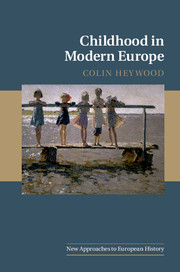‘Historians have started to wrench childhood from the historical shadows and explore its social, cultural and economic aspects. The result is a burgeoning and diverse literature. Colin Heywood, one of the early contributors, has pulled this literature together, ranging over modern Europe and employing ideas and arguments from sociology, anthropology, psychology, economics and social policy. The result is a masterly survey, a necessary addition to the libraries of teachers and students alike. But Heywood goes beyond a historiographical review to challenge a complacent or Panglossian view of the history of childhood. The book hammers home what we (especially children) have gained but also suggests what we (and especially children again) might have lost: an important read.'
Jane Humphries - University of Oxford
‘Colin Heywoodʼs masterful survey examines important debates and major changes that defined the history of childhood in modern Europe. This marvellously accessible book traces key shifts in the realm of ideas while also bringing to light the remarkable diversity of children's experiences.'
David M. Pomfret - The University of Hong Kong
‘This new volume provides a welcome contribution to the history of childhood, focusing on conceptions of the child and developments in childhood in Europe, from the early eighteenth century until the turn of the twenty-first. The book is wide-ranging in its rich considerations of how work, education, science, health, economy and family have influenced and shaped the experience of childhood over time.'
Heather Shore - Leeds Beckett University
'The transformation of childhood experience had an enormous impact in Europe as it modernised, and Colin Heywood's lucid and absorbing overview contributes significantly to the understanding of the processes involved. A significant strength is the breadth of coverage, including Russia and Eastern Europe as well as the better-known West. This is a major contribution to the social and cultural history of the period.'
Catriona Kelly - University of Oxford
'Heywood … fills a niche here with an up-to-date survey of childhood across modern Europe. After discussing premodern childhood, Heywood matches changes in childhood in modern Europe to trends of industrialization and the Enlightenment. Industrialization shifted rural children as well as adults to towns, where the children initially worked in factories as they had worked in the fields. Enlightenment thought viewed children as individuals to be respected and nurtured and prompted more-scientific approaches to child development and education - first among newly leisured middle- and upper-class children in the towns but eventually including working-class and rural children, slowly removing them from work and thus extending their childhoods. Rounding out this survey is discussion of the negotiation of childhood’s boundaries and the growth of childhood culture, changes in children’s material conditions, and fulfilling children’s potential. This book is both rich and accessible … Highly recommended.'
R. Spickermann
Source: Choice



